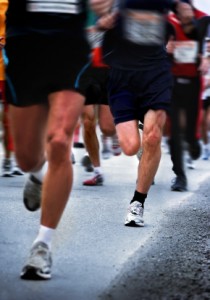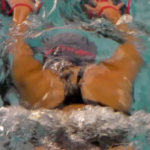As you know, part of the Where do I Run team competed in the Paris Marathon last April. It was the 1st marathon for all of us and we were excited in having finished it (we will provide highlights of the race in another post). Following experts recommendations, we all took a week off after the race, with no real exercising; however, some of us got a common cold or sore throat symptoms, which is not uncommon since your immune system is affected due to the physical (and mental) effort your body is put on in completing a marathon.
In my case, I decided to pick up my running routine 10 days after the race. I hit the road with my new shoes and after finishing 7K, my right leg was really sore. I thought the pain will go away, but it didn’t. I opted to cut the running altogether and focus on cycling and going to the gym to lift some weights for the upper body until I could run again. Then, I got a cold, with nasal and sinus congestion, plus a sore throat. I had signed up for a 15K (the race was 6 weeks after the marathon), which forced me to start building up my miles again. Thus, each time I went out for a run, I got frustrated, since due to the congestion I hardly could keep up with my normal pace, this on top of still some pain in my leg. So I decided to completely stop any physical exercise till I fully recover. After 10 days with the cold (this is almost 5 weeks after the marathon), I went for a 5K; more than the distance itself, it was tough to wake up early and be motivated to go out. The leg didn’t hurt, but I will probably “take a rain check” on the 15K, since I don’t feel my body is ready yet.
My takeaways from this experience are the following:
- A marathon stresses a lot your muscles and your body (the effects on the muscular-skeletal system are tremendous, with muscles experiencing micro-traumas); getting sick, taking longer to recover and feeling soreness and pain in your legs is normal after the race.
- Don’t push yourself to get back into a running routine; take as much time as you need it to fully recover (some websites mention taking about a day off per every kilometer you ran, that’s 42 days).
- Try cross-training during your non-running period; spinning and swimming are great ways to stay in shape, without over-stressing your muscles.
- Don’t sign up for a race until you are back into your running routine, feeling strong and motivated (like in my case, you might end unnecessarily stressing yourself up).
- If you feel you have lost your motivation to train again, try new running trails, add new songs to your IPod/MP3 player, and/or just run for the fun of it without any particular goal/race in mind.
- Finishing a marathon is a great achievement, so indulge yourself; eat what you want, spend more time with friends and family, and enjoy non-athletic activities; eventually, in no time your body will tell you when you are ready to hit the road again.



